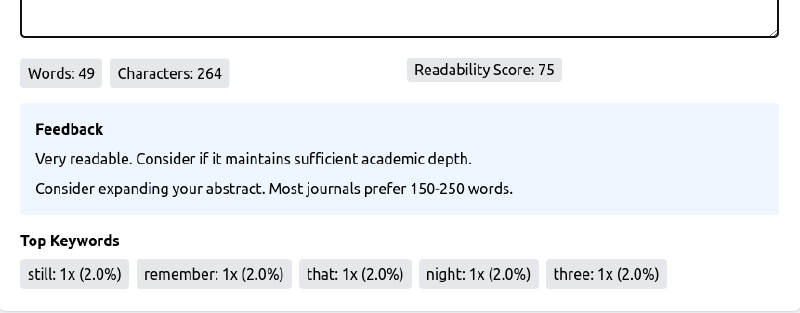I Still Remember That Night
Three cups of coffee in, staring at my computer screen at 2 AM, trying to perfect an abstract for my research paper. The deadline was looming, and I kept asking myself the same questions:
- Is this readable enough?
- Am I using too much jargon?
- Are my keywords aligned with what journals are looking for?
That frustration led to the creation of our free Abstract Analyzer tool at callforpaper.org. But before I tell you about the tool, let me share why this matters so much.
The Hidden Challenge of Academic Writing
We’ve all been there. You’ve spent months (or years) on your research, and now you need to condense it into a 250-word abstract that will determine whether anyone reads your full paper. It’s like trying to describe a cathedral through a keyhole – every word matters.
The problem? Most of us were never really taught how to write abstracts. Sure, we’ve read hundreds of them, but writing one that’s clear, engaging, and academically sound? That’s a different story entirely.
From Frustration to Solution
After talking with countless fellow researchers and experiencing the struggle firsthand, we decided to build something that could help. The Abstract Analyzer isn’t just another writing tool – it’s your academic writing companion that offers:
🔍 Real-time Readability Analysis
Using a sophisticated algorithm, it measures how accessible your writing is. Not to dumb it down, but to find that sweet spot between academic rigor and clarity.
📊 Keyword Density Insights
Ever wondered if you’re overusing certain terms? Our tool shows you your most frequently used words and their density, helping you maintain balance and emphasis.
✍️ Smart Word Count
Because different journals have different requirements, and going over or under can mean instant rejection.
Beyond Just Analysis
What makes our tool different is that it doesn’t just give you numbers – it provides actionable feedback.
- If your readability score is low, it suggests specific improvements.
- If your abstract is too long or too short, it tells you based on common journal standards.
The Real Impact
Since launching the Abstract Analyzer, we’ve received messages that warm my heart.
- A PhD student in Malaysia told us how it helped her get her first paper accepted.
- A veteran professor in Germany uses it to help his students understand academic writing better.
It’s Free (And Always Will Be)
Here’s the thing – we could have made this a paid tool. Many similar services charge subscription fees. But we remember being graduate students, counting every dollar. That’s why we made the Abstract Analyzer completely free and accessible through callforpaper.org.
Looking Forward
Academic writing shouldn’t be a barrier to sharing valuable research. Our Abstract Analyzer is just one step toward making academic publishing more accessible and less stressful. We’re constantly improving it based on user feedback and real needs from the academic community.
Try It Yourself
Head over to Abstract Analyzer and paste in your abstract. Whether you’re a seasoned researcher or working on your first paper, you might be surprised by what you learn about your writing.
Remember, behind every great research paper is an abstract that got someone to read it. We’re here to help make sure yours does exactly that.
If you found this helpful…
✅ Consider subscribing to this newsletter for more insights into academic writing and research.
✅ Share your experiences with the Abstract Analyzer – your feedback helps us make it even better for the entire academic community.
📌 Author’s Note
As someone who’s spent countless hours both writing and reviewing academic papers, creating tools that make this process easier has become something of a mission. The Abstract Analyzer is just the beginning of what we hope to offer the academic community through callforpaper.org.
